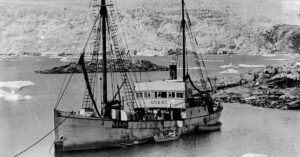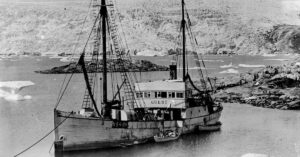
Italian Coast Guard Rescues 85 People From Sinking Passenger Ferry In The Gulf Of Trieste
June 13, 2024
Panama Canal Authority Increases Daily Ship Transits From 32 To 33
June 13, 2024

The wreck of Sir Ernest Shackleton’s last ship, Quest, has been discovered in the Labrador Sea.
The vessel, which served as the final platform for Shackleton’s Antarctic ambitions, is upright and intact at a depth of 390 meters northwest of St. John’s and east of Battle Harbour, Labrador.
The Royal Canadian Geographical Society led the expedition that discovered Quest.
Unfortunately, in 1922, Shackleton died aboard the ship while it was docked in Grytviken Harbour on South Georgia Island.
The discovery not only reinforces Shackleton’s enduring legacy but also creates an essential connection between Canada and the Heroic Age of Antarctic exploration.
Quest’s journey began with Shackleton’s Shackleton-Rowett Expedition in 1921, when he departed London for what he termed his “swan song.”
After Shackleton died of a heart attack while on board, the ship continued its remarkable career, even serving as a minesweeper and water supply vessel for the Royal Canadian Navy during World War II.
The search for Quest was rigorous, led by famous shipwreck hunter David Mearns and main researcher Antoine Normandin.

Months of investigation, including analysis of historical archives and high-resolution sonar footage, culminated in the discovery of the vessel’s last resting place.
The explorer’s granddaughter, the Hon. Alexandra Shackleton, was among the first to be informed of the discovery and has dedicated her life to preserving his memory.
She recently installed a commemorative plaque at Westminster Abbey in London, marking the 150th anniversary of Shackleton’s birth earlier this year.
John Geiger, the expedition leader, stated that discovering Quest is one of the concluding chapters in the extraordinary story of Sir Ernest Shackleton.
The finding not only commemorates Shackleton’s bravery and leadership but also demonstrates the combined efforts of an international team from Canada, the United States, the United Kingdom, and Norway.
The significance of Quest’s finding goes beyond exploration; it demonstrates the vessel’s ties to indigenous lands and waterways, where it operated alongside the Mi’kmaq, Innu, and Inuit people.
Chief Mi’sel Joe of the Miawpukek First Nation applauded the Society’s courteous approach to the search, highlighting the significance of honouring these connections.
The Royal Canadian Geographical Society’s discovery ensures that Shackleton’s legacy, interconnected with Quest’s trip from Antarctica to the Labrador Sea, will continue to captivate and inspire future generations.
Reference: Canadian Geographic
Wreckage Of Ernest Shackleton’s Last Vessel Discovered Off Newfoundland appeared first on Marine Insight – The Maritime Industry Guide
Source: Maritime Shipping News


